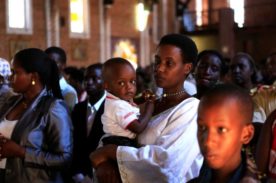
OXFORD, England (CNS) – The Rwandan Catholic bishops’ conference urged the government of President Paul Kagame to preserve religious rights after government officials closed thousands of churches and mosques.
The buildings remained locked because of what the government said were health and safety issues, including lack of toilets, plastered walls and paved access roads.
“Most Catholics are shocked and disappointed; they don’t understand what’s happening and why there’s been no explanation,” said Father Martin Nizeyimana, the Kigali-based bishops’ conference secretary-general.
Catholics make up around half the 12 million population of Rwanda, where religious groups have proliferated since a 1994 genocide of more than a million members of the Tutsi minority. A July 28 government statement said recognized religious denominations had grown from 50 to more than 1,000 since 1994.
In late July, the government said the safety measures had been agreed upon at a Feb. 15 meeting between government officials and “church leaders,” following an “extensive consultation process.”
Father Nizeyimana said Rwandan Catholic leaders had been represented at the talks but given “no warning or information” about the forced closures.
The government statement confirmed that 1,381 Pentecostal prayer houses had been closed under the February decree, and 15 percent of all mosques, as well as more than a third of the 71 Catholic churches in Rwanda’s western Rusizi district alone.
Father Nizeyimana also told CNS that the bishops were dismayed that promises made during Kagame’s March 2017 talks at the Vatican with Pope Francis had not been honored. The official said the bishops would meet soon to adopt a “more muscular position” on current developments.
“Although progressive improvements were signaled last year, these have clearly remained at the level of declarations, causing inconvenience and disappointment,” Father Nizeyimana said.
